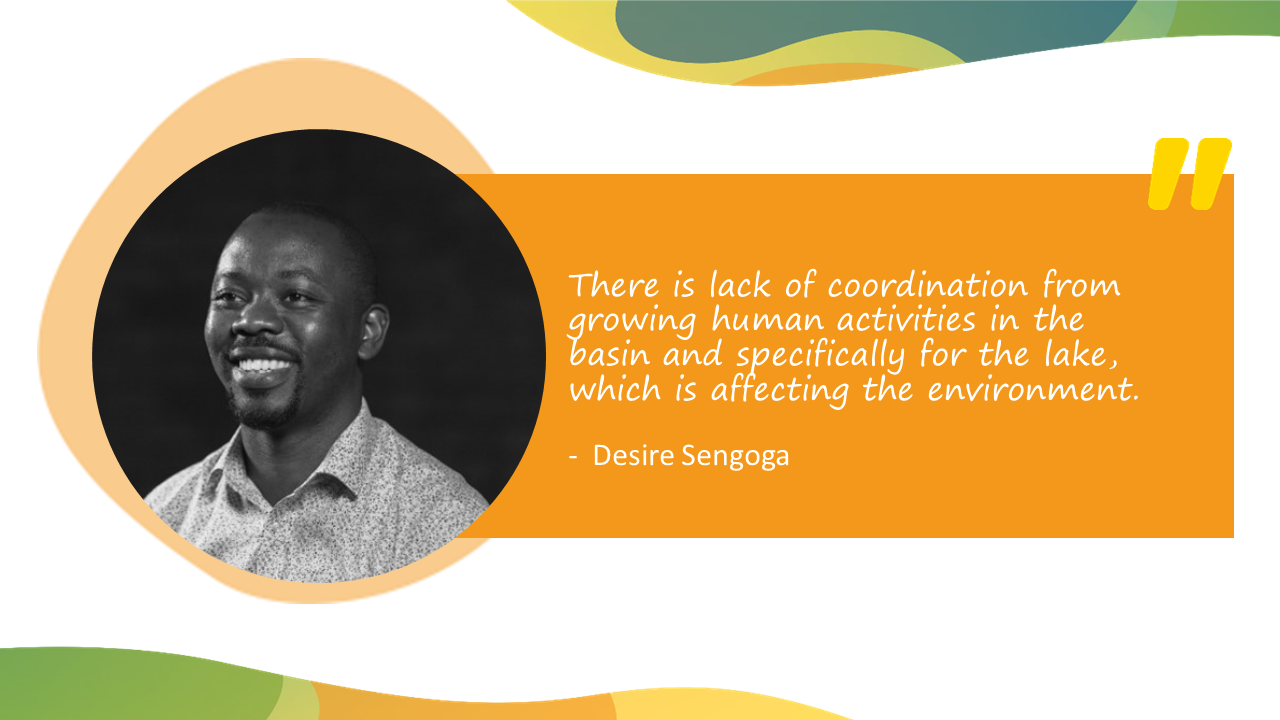Nexus Interview Series // Desire Sengoga, Regional Advisor for the support to the integrated management of water resources of lake Kivu and Ruzizi river
The interview series aims to provide a better picture of the people within the Nexus team and their perspectives on Water Energy Food Nexus challenges and opportunities. In this episode, we invite you to get to know Desire Sengoga, Regional Advisor of the project "Support to the integrated management of water resources of lake Kivu and Ruzizi river".

Desire is from Kigali, Rwanda and works as regional Advisor for transboundary water management on the European Union (EU) and the German Ministry for Economic Cooperation and Development (BMZ) co-funded project to “Support to the Integrated Management of Water Resources of Lake Kivu and the Ruzizi River basin’’ shared with Rwanda, Burundi and DRC.
The project goal is to improve the hydrological and operational management of Lake Kivu and the Ruzizi River while pursuing an integrated and Nexus-based approach. He co-manages contracts, organised the training and capacity development workshops across the region and regularly takes part in meetings and consultations with local and international institutions around the topic of transboundary water resources management using the WEF Nexus approach.
He holds a Bachelor’s degree in civil engineering from the University of Rwanda and a Master’s degree in Water sanitation and Health Engineering from The University of Leeds, UK.

What does the WEF Nexus approach mean to you and how would you describe it in your own words?
Desire: It is an integrated and sustainable approach to manage and effectively use the natural resources of water for the pursuit for human development considering on how the water interacts with the energy and agricultural sectors.
What are the main Nexus challenges in Lake Kivu and Ruzizi River? Can you mention a specific example?
Desire:
- There is huge urban and population growth thus increasing the consumption on for water energy and food
- The water quality is at risk from poor urban sanitation of cities around the lake and high soil erosion and
- Poor solid waste management specifically plastics affecting the energy production operations and marine life
- There is lack of coordination from growing human activities in the basin and specifically in lake which affecting the environment
- Low policy and law enforcement, differences in legal and regulations from the 3 countries
What is the most promising approach for implementing/mainstreaming WEF Nexus in Lake Kivu and Ruzizi River? And why?
Desire: The best approach would be to first assess and understand the social-economic and environmental context of the area taking into account the geopolitical aspects and development priorities of the countries. Then from there design national and regional projects and programs that will increase the cooperation of countries, data sharing and even harmonisation of the laws and regulations in the basin. Last but not least support the government and stakeholders in capacity building to understand and implement transboundary water resources management principles and best practices.
Thank you Desire for taking the time to answer these questions!
More Information on the project Support to the integrated management of water resources of lake Kivu and Ruzizi river
- Nexus Fact Sheet // Support of the water resources management at Lake Kivu and the Ruzizi River
- Project // Support to the Integrated Management of Water Resources of Lake Kivu and Ruzizi River
- Factsheet // Baseline Study of Lake Kivu and the Ruzizi/Rusizi River
- Report // Baseline Study for the Basin of Lake Kivu and the Ruzizi River
Read more of our interview series "Introducing the Nexus Dialogue Programme and the People behind it" here:
- Nexus Interview Series // Kristine Herbomel, Advisor Support to the integrated management of water resources of lake Kivu and Ruzizi river
- Nexus Interview Series // Introducing the Nexus Dialogue Programme and the People behind it: Irene Sander, Coordinator of the Global Nexus Secretariat
- Nexus Interview Series // Introducing the Nexus Dialogue Programme and the People behind it: Antonio Levy (Coordinator of the Nexus Dialogue in Latin America and the Caribbean)
